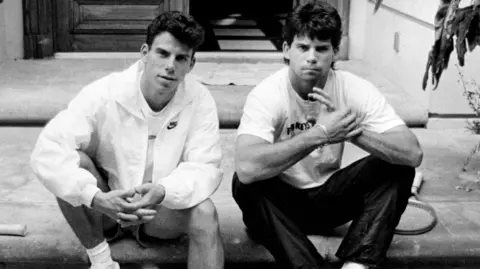A Los Angeles courtroom has once again been the setting for one of America’s most infamous cases: the Menendez brothers’ retrial. Erik and Lyle Menendez, both serving life sentences for the brutal murders of their parents, Kitty and Jose Menendez, in their Beverly Hills mansion back in 1989, have taken a significant step towards the possibility of freedom. In a significant ruling made by Judge Michael Jesic, the court has resentenced the brothers to an updated term of 50 years to life, thus opening the door for them to seek parole after more than three decades in prison.
The Menendez brothers’ original view of the murders involves a tragic narrative of self-defense after enduring years of alleged abuse from their parents. However, the prosecution has painted a starkly different picture, asserting that the brothers plotted the heinous shotgun killings to inherit their parents’ substantial wealth. This case stirred considerable public interest in the years following the murder, spawning countless documentaries, books, and debates surrounding issues of abuse, morality, and the complexities of justice.
Following the judge’s ruling, both Erik and Lyle Menendez offered emotional statements reflecting on their past actions. During this poignant session, the brothers revisited the harrowing details of that fateful night, expressing remorse and articulating their desire to contribute positively to society if given a chance. Erik Menendez, in his statement, shared insights into the emotions that overtook them during the incident, suggesting a profound realization of their parents’ supposed experiences in their final moments. This deep reflection underscores the complicated emotions surrounding their case, as both brothers highlighted the feelings of shock, confusion, and betrayal that their parents might have felt as they faced their sons armed, ready to inflict fatal harm.
Meanwhile, Lyle Menendez’s remarks revealed the impact of their actions, emphasizing the need for his family’s forgiveness amid the public humiliation they have endured. His emotional appeal resonated within the courtroom, as he acknowledged the pain caused and expressed gratitude toward his family for their support throughout the tumultuous years. Judge Jesic acknowledged the remarkable progress both men have made during their time incarcerated, although he also noted that their original sentencing was justified in light of the circumstances back when the crimes took place.
The expectation surrounding parole hearings now looms large for the brothers. Following their resentencing, a wave of family support emerged in court, where relatives argued for their chance at redemption and rehabilitation. Anamaria Baralt, the brothers’ cousin who took to the stand, expressed the family’s ardent hope for a second chance for Erik and Lyle. Courageously proclaiming that it had been a long nightmare, she conveyed their eagerness to welcome the brothers back into the fold. Baralt characterized Lyle and Erik as fundamentally changed individuals, demonstrating growth and self-awareness during their lengthy incarceration.
Contrarily, the path to freedom remains fraught with challenges. Relatives of the victims continue to voice strong objections, arguing that the brothers have yet to take full responsibility for their actions. As the legal framework allows for this resentencing based on changing guidelines after 30 years, the parole board process is expected to be rigorous. Friends and family will not only have hopes pinned on the brothers’ presentations but also deep concern for the challenges that may lie ahead as they traverse the intricacies of the corrections system.
In summary, the resentencing of Erick and Lyle Menendez symbolizes a pivotal moment in a case that has transfixed the American public for decades. As they now stand eligible for parole, both brothers’ emotional admissions and the advocacy from their family encapsulate a journey toward healing and justice. Though the road ahead is laden with uncertainty, it offers a glimpse into the complex dynamics of forgiveness, the quest for understanding, and the broader implications of accountability within the legal system.



